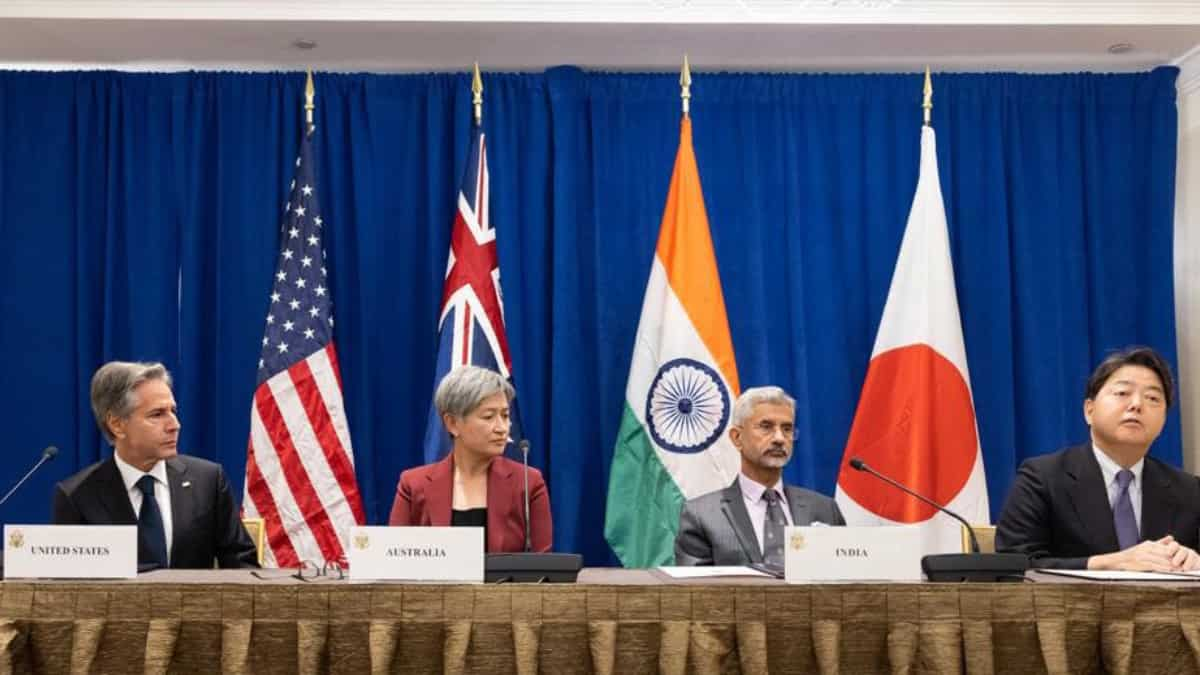


In a brief meeting on the sidelines of the United Nations General Assembly, Indian External Affairs Minister S Jaishankar and his Iranian counterpart Seyed Abbas Araghchi discuss mutual concerns and bilateral relations. The meeting took place before the BRICS nations' meeting, where the two countries are part of the emerging economies bloc. The meeting comes at a critical time as tensions rise in West Asia due to conflicts involving Iran and other neighboring countries like Israel and Yemen.
India-Iran Bilateral Relations: Strengthening amid Regional Tensions
India and Iran have maintained a close strategic partnership for decades, despite geopolitical challenges in the West Asia region. Recently, a meeting between External Affairs Minister S Jaishankar and his Iranian counterpart Seyed Abbas Araghchi on the sidelines of the United Nations General Assembly (UNGA) highlighted the ongoing diplomatic engagement between the two nations.
Background
India and Iran share historical and cultural ties dating back centuries. The two countries have a strong economic relationship, with Iran being India's third-largest crude oil supplier. India also invests significantly in Iran's infrastructure and energy sectors.
However, the relationship has faced challenges in recent years due to the following factors:
Current Developments
The meeting between Jaishankar and Araghchi focused on discussing mutual concerns and bilateral relations. Both sides reiterated their commitment to strengthening economic cooperation and resolving outstanding issues. The meeting also comes amid escalating tensions in West Asia, particularly between Iran and Israel.
India remains cautious about taking sides in regional conflicts, while also maintaining its strategic interests with both Iran and Israel. The meeting at UNGA suggests that India is actively engaging with both countries to promote peace and stability in the region.
Top 5 FAQs
1. What are the key areas of India-Iran bilateral cooperation? A: Trade, energy, infrastructure, and defense.
2. How have US sanctions impacted India-Iran relations? A: The sanctions have restricted oil imports and financial transactions, but India has sought waivers to continue limited trade.
3. What is India's stance on the Iran nuclear deal? A: India supports the deal as a diplomatic solution to the nuclear issue and believes it should be preserved.
4. How does India view the regional tensions involving Iran? A: India advocates for dialogue and de-escalation, while respecting the sovereignty and territorial integrity of all countries in the region.
5. What is the significance of the Jaishankar-Araghchi meeting at UNGA? A: It demonstrates India's commitment to maintaining diplomatic engagement with both Iran and Israel, and promoting stability in the region.
Conclusion
The meeting between Jaishankar and Araghchi reflects the ongoing efforts by India and Iran to strengthen their bilateral ties despite regional challenges. India's balanced approach, maintaining relations with both Iran and Israel, is crucial for promoting peace and security in West Asia. Continued diplomatic engagement and dialogue remain essential for addressing outstanding issues and ensuring a stable future for the region.

Indian Prime Minister Narendra Modi celebrated Diwali with Navy personnel on the country's new aircraft carrier, INS Vikrant. He extended Diwali greetings to the nation and shared highlights from his visit, including an air power demonstration and cultural program. PM Modi also addressed the significance of Diwali and expressed his best wishes to the families of the Navy personnel.

In a tense meeting at the White House, President Donald Trump urged Ukrainian President Volodymyr Zelensky to accept Russian President Vladimir Putin's terms for ending the two-year war in Ukraine. Despite seeking more military support from the US, Zelensky was met with resistance from Trump, who reportedly engaged in a "screaming match" with the Ukrainian leader. The US leader even claimed that Putin saw the conflict as a "special operation" rather than a full-fledged war, further complicating negotiations between the two nations.

As Liverpool struggled to find their form in a tough game against Manchester United, Dutch midfielder Cody Gakpo stood out with his sharp attack and strong composure. Despite hitting the woodwork three times, Gakpo managed to score a brilliant equalizer for his team, showcasing his potential and talent on the field. While Liverpool may have lost the match, Gakpo's impressive performance provided a glimmer of hope for a struggling team.

Ayodhya's Deepotsav 2025 was a shining example of faith, community, and innovation as the city set two new world records with over 26 lakh diyas and a grand aarti performed by 2,100 priests. The event, witnessed by Chief Minister Yogi Adityanath, also showcased a spectacular 3D projection mapping and drone light show that brought Lord Ram's story to life in the night sky. The event was a testament to the deep connection Ayodhya's youth have with Lord Ram's ideals and was made possible by the hard work of over 40 potter families and thousands of volunteers.

In a brazen and perfectly orchestrated robbery, a group of thieves infiltrated the world-famous Louvre Museum in Paris on Sunday morning and made off with a collection of priceless jewels with an estimated value in the millions. French officials confirmed the robbery and began a detailed investigation to determine how the culprits managed to evade the museum's advanced security systems and execute the crime in under seven minutes. This latest incident has raised serious concerns about the protection of national treasures at one of the world's most popular tourist destinations.

In an audacious heist, a group of armed thieves breached security at the iconic Louvre Museum in Paris and stole nine valuable jewels from the collection of Napoleon Bonaparte and Empress Joséphine. The robbery, which took place in just seven minutes, has prompted a full-scale police investigation and raised concerns about the museum's security. French officials are working to recover the stolen items, but the Louvre remains closed to visitors.

Despite a ceasefire in early October, the conflict between Israel and Palestine shows no signs of abating, with reports of ongoing deadly clashes and Israeli tank fire targeting a car in Gaza City. The closure of the Rafah border crossing to Egypt, citing Hamas's failure to retrieve bodies, has further exacerbated tensions. However, experts warn of the uncertain future for a transitional government in Gaza and the risk of breaching the fragile ceasefire. The violence and closure highlight the ongoing humanitarian crisis and the need for both sides to engage in peaceful negotiations.

Hundreds of travellers heading to India from Italy for Diwali were left stranded after Air India cancelled its Milan-Delhi flight due to a technical issue. The sudden breakdown of the flight raised concerns about making it home in time for the festival. Some passengers even face the prospect of celebrating Diwali away from home due to rebookings on alternate flights. Air India assured that they are prioritising passenger safety and comfort while providing necessary support to those affected.

On day 1,312 of Russia's war on Ukraine, tensions continue to escalate as Ukrainian drones target a Russian oil pumping station, Russian forces seize three more villages in eastern Ukraine, and NATO increases its presence in the Baltic Sea region. In response to the ongoing conflict, the Ukrainian security service reports that the SBU caused a fire and halted operations in the Chuvashia region, while Russia's military announced its continued advance in Donetsk and Dnipro. Meanwhile, NATO's decision to deploy additional military assets comes after several days of unidentified drone sightings in Denmark and at military bases.

The upcoming India-Australia ODI series has drawn attention for multiple reasons, including the successful return of Rohit Sharma and Virat Kohli as white-ball players. Despite being relieved of captaincy, the duo is expected to continue playing in the format until the 2027 World Cup, according to Australia's Travis Head and India's Axar Patel. As both teams gear up for a high-stakes clash, the focus remains on the future of these two icons and their potential to lead India to another ODI World Cup victory.